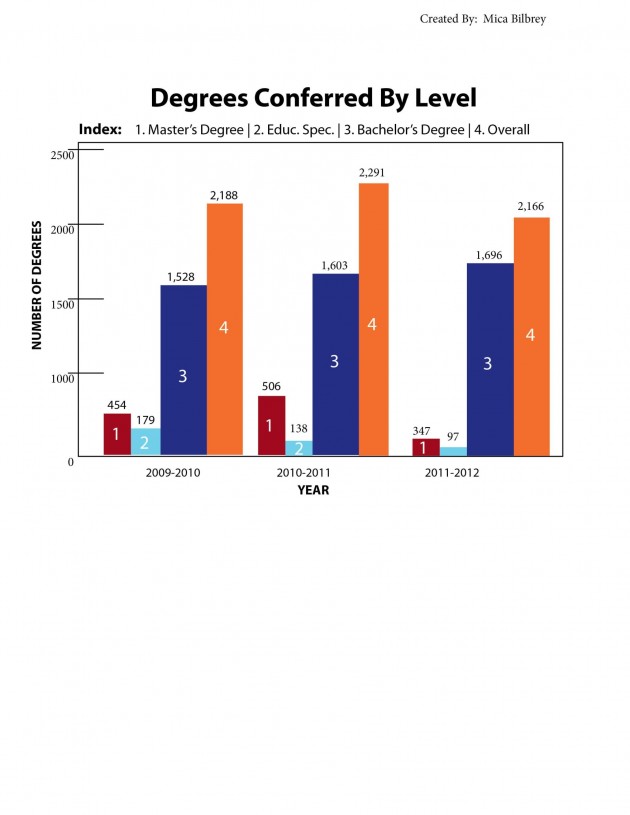
A new plan to base a university’s state funding on graduation rates is going to cause some major changes to Tech, including a reduction in state funding.
Previously, state funding was based on enrollment numbers. The goal of this program, called the Complete College Act, is to raise Tennessee’s overall graduation rates by directly linking the amount of state funding received with the amount of bachelor’s, master’s and doctorate degrees.
Tech’s overall graduation rate declined between last year and this year.
“It really concerns me that our graduation rate has declined,” Claire Stinson, vice president for business and fiscal affairs, said. “If we continue to decline our average will continue to get smaller, and that is not a good thing. We have to reverse that trend.”
According to a 2013-2014 Funding Formula data sheet released by the Tennessee Higher Education Commission and the Tennessee Board of Regents, the amount of bachelor’s degrees earned increased from 1,603 to 1,696 between last year and this year. However, Tech will lose some state funding due to a decrease in the amount of degrees earned overall. The amount of master degrees earned by Tech students dropped from 506 to 347 over the last year. This is what caused the decline in overall degrees earned.
“We’ve got several things in 2011-12 that we have to worry about,” Stinson said. “Our average will be less in our 2013-14 funding year.”
This drop in average will decrease the amount of state funding Tech receives next year.
Tech has had problems with the Complete College Act even before its full implementation.
“There was a phase out period, so colleges and universities who had grown in enrollment did not get any additional funding,” Stinson said. “Tech lost, let’s just say to round the number, $2 million.”
Stinson said Tech went on to cover its $2 million loss in state funding thanks to a $25 million “infusion of funding” into higher education from the state. This allowed Tech to come out of the phase out period $123,000 in the green.
“It [increasing the graduation rate] is a shared responsibility between the student, the faculty and the university,” Stinson said. “We have to be providing the support services students need.”
Tech is now planning on implementing programs designed to keep students enrolled and eventually have them get a degree. Programs like this will help students like junior Kane Pedigo, who had to miss last semester because of financial aid issues. Pedigo is frustrated with the lack of support he has received from the university but also acknowledges that Tech wants him to graduate.
“Alumni make donations,” Pedigo said. “Dropouts don’t. I had professors encourage me to come back, but I don’t think the school itself showed any interest.”
Stinson hopes some of these new programs will change the way frustrated students view their relationship with Tech.
“Sometimes students have the misconception that we do not care and that they’re just a number, and that is just not true at this university,” Stinson said. “The problem is getting the communication flowing between students and staff. That is why we want to implement these programs.”
Some of the programs Tech plans on implementing in the future are software to allow students easier access to their educational history and an alert system that will email students who are missing class consistently.
Despite the optimism Stinson expressed for these retention programs, she worries about the future impact of the Complete College Act if Tech is unable to reverse the trend of declining graduation rates.
“It really concerns me that our master’s program has declined significantly while our bachelor’s degree rates have increased,” Stinson said. “That is not a good trend.”


